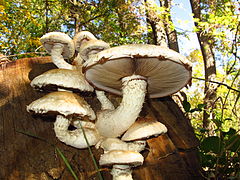| Hemipholiota | |
|---|---|

| |
| Hemipholiota populnea | |
| Scientific classification | |
| Kingdom: | |
| Division: | |
| Class: | |
| Order: | |
| Family: | |
| Genus: | Hemipholiota |
| Type species | |
| Hemipholiota populnea | |
| Species | |
| Synonyms | |
Hemipholiota is a genus of agaric fungi in the order Agaricales. It was originally proposed by Rolf Singer in 1962 as a subgenus of Pholiota to contain species with absent or sparse pleurocystidia and absent chrysocystidia.[2] Henri Romagnesi raised it to generic status in 1980, but this naming was invalid as it did not meet the requirements of the International Code of Nomenclature for algae, fungi, and plants.[3] Marcel Bon published the genus validly in 1986.[4]
Molecular analyses revealed that Hemipholiota was distinct from Pholiota[5][6] and also from a new genus Hemistropharia[7][8] that had been classified with Hemipholiota. Both genera fall outside of the Strophariaceae. The generic name required conservation against an older obscure name.[8]
The Hemipholiota spore print is brown in its appearance.
- ^ Cite error: The named reference
Pilát 1933was invoked but never defined (see the help page). - ^ Cite error: The named reference
Singer 1962was invoked but never defined (see the help page). - ^ Cite error: The named reference
urlIndexFungorum: Hemipholiotawas invoked but never defined (see the help page). - ^ Cite error: The named reference
Bon 1986was invoked but never defined (see the help page). - ^ Cite error: The named reference
Moncalvo2002was invoked but never defined (see the help page). - ^ Cite error: The named reference
Guldenwas invoked but never defined (see the help page). - ^ Cite error: The named reference
Jacobsson_Larsson_2007was invoked but never defined (see the help page). - ^ a b Cite error: The named reference
Jacobsson_Holec_2008was invoked but never defined (see the help page).